|
|
|
Sort Order |
|
|
|
Items / Page
|
|
|
|
|
|
|
| Srl | Item |
| 1 |
ID:
182618
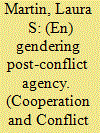

|
|
|
|
|
| Summary/Abstract |
This article explores how female agency and experience manifest in a local Sierra Leonean peacebuilding program known as Fambul Tok. While post-conflict literature, namely transitional justice and peacebuilding, has become more critical in recent years, there is still a tendency to generalize both the ‘local’ and ‘women’. There is, however, much greater scope to delineate how local programs shape and are shaped by women in these settings. While Fambul Tok was, at least theoretically, meant to better align with the needs and priorities of Sierra Leoneans, including women, the empirics suggest that female engagement ultimately results in a wide range of outcomes, which are not necessarily more ‘empowering’, ‘transformative’ or ‘good’ than international programs. Drawing on original empirical data from Fambul Tok, this article highlights the complexity of gendered power relations within these programs and how individual women have multiple, diverse and contested forms of agency and experiences within local settings.
|
|
|
|
|
|
|
|
|
|
|
|
|
|
|
|
| 2 |
ID:
167106


|
|
|
|
|
| Summary/Abstract |
Although the collective memory of war is frequently invoked in post-war societies, who chooses to invoke it and to what effect has been less studied relative to other aspects of such societies. In this article we employ a case study of Sierra Leone to address this deficit in the post-conflict scholarship by illustrating how the collective memory of that country’s civil war is appropriated by diverse actors in the post-war society. Drawing from field interviews, we present evidence showing how, and why, several societal groups constituted as distinct post-war identities such as victims-rights groups, former defenders of the state, or perpetrators of the violence during the Sierra Leone civil war articulate dissatisfactions with their livelihoods and the reactions of state officials to their demands. The article explains why, and how, successive governments have selectively suppressed the discontent of some groups over livelihood insecurities that are construed as threats to public order while ignoring violent protests from other groups over similar issues, in spite of a 1965 public order act restricting protests. Thus, the article argues that state officials in Sierra Leone have not demonstrated superior commitment to peacebuilding than societal groups that make demands on the state.
|
|
|
|
|
|
|
|
|
|
|
|
|
|
|
|
| 3 |
ID:
177863
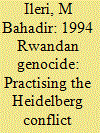

|
|
|
|
|
| Summary/Abstract |
Having suffered one of the worst genocides in recorded history, Rwanda today is a country still striving to maintain the equilibrium between the perpetrators and the survivors. After decades of tension between the Hutu majority and the Tutsi minority, during April to July 1994 an estimated 500,000 to 800,000 people were slaughtered in mass atrocities, with many more displaced from their homes. Political instability, discrimination, traces of colonialism, poverty and competition for power were some of the causes of this horrific extermination. Rwanda has been working ever since to recover from the aftermath of the events that culminated in this government-sponsored slaughter, and has achieved remarkable success – especially in terms of its economy. This study aims to explore the nature of the 1994 genocide against the Tutsi in Rwanda. Fundamentally, it seeks to quantify the intensity and unprecedented nature of the genocide. Understanding how genocides such as this one occurred is crucial for preventing similar future atrocities.
|
|
|
|
|
|
|
|
|
|
|
|
|
|
|
|
| 4 |
ID:
082224
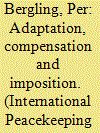

|
|
|
|
|
| Publication |
2008.
|
| Summary/Abstract |
Just as the international community was late in discovering the significance of the judiciary for the success of peacebuilding in Bosnia and Herzegovina, international agencies were also late in identifying corruption as a key reason why the Bosnian judicial agencies were not working. The steps taken eventually to address the situation, including introducing reformed judicial admission, discipline and dismissal regimes, were not strategic, but reactive in nature. Notably, the international community initially adhered to the idea that these reforms should be domestically 'owned' and 'led', and that the resulting laws should resonate well with pre-existing legal-cultural paradigms; but as this process did not produce the desired results, the Office of the High Representative and the Independent Judicial Commission chose gradually to increase their involvement, eventually assuming almost complete control over the process. The process culminated in the firing of almost the entire Bosnian judiciary and the imposition of an internationalized structure for judicial appointments and dismissals. Although this policy stood in stark contrast to the values of local ownership and local leadership, it has essentially produced positive long-term results.
|
|
|
|
|
|
|
|
|
|
|
|
|
|
|
|
| 5 |
ID:
108742
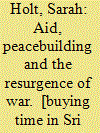

|
|
|
|
|
| Publication |
Hampshire, Palgrave Macmillan, 2011.
|
| Description |
xviii, 222p.
|
| Standard Number |
9780230240278
|
|
|
|
|
|
|
|
|
|
|
|
Copies: C:1/I:0,R:0,Q:0
Circulation
| Accession# | Call# | Current Location | Status | Policy | Location |
| 056386 | 954.9303/HOL 056386 | Main | On Shelf | General | |
|
|
|
|
| 6 |
ID:
171869
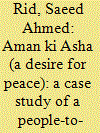

|
|
|
|
|
| Summary/Abstract |
Aman ki Asha is a joint initiative of the two leading media groups of India and Pakistan, The Times of India and the Jang Group of publications, which uses media cooperation for promoting people-to-people contacts and building peace. This is a unique initiative because in the history of peacebuilding, never before the mainstream media houses of conflicting communities are involved in such a peace initiative. Generally local media is seen inflaming the fires of conflict by following the nationalistic lines and portraying one sided picture of the conflict. After its launch in 2010, within few years Aman ki Asha emerged as one of the most successful peace initiatives between India and Pakistan but then suddenly in 2014 it became dormant when Jang group came under attack from the Pakistani military establishment and bilateral India-Pakistan relations worsened under Modi government in India. In this paper an attempt is made to provide a holistic story of Aman ki Asha covering its rise and decline. Moreover, the role played by Aman ki Asha in building peace between India and Pakistan at the top level, the middle range level and the grassroots levels is studied, and its current status is determined.
|
|
|
|
|
|
|
|
|
|
|
|
|
|
|
|
| 7 |
ID:
180190
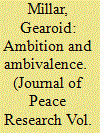

|
|
|
|
|
| Summary/Abstract |
For 50 years positive peace has served as an aspirational goal for many scholars and practitioners of peace. However, much recent scholarly literature evidences a substantial ambivalence toward this ambition, suggesting that prominent theories, policies and practices in the field have failed to support positive peace. This article argues that a key reason for this shortcoming is the field’s failure to respond adequately to the evolving character of conflict (latent and overt) related to technological, legal and economic changes associated with the consolidation of globalization over this period. This consolidation has served to shrink the distances between previously remote actors, to expand exponentially the influence of many institutions, norms, practices and projects as they penetrate new societies, to concentrate power into the hands of ever fewer actors, and to reify instead of deconstruct endemic inequality and marginalization within states, between states, and across the globe. The failure of the field to respond robustly to these changes also prompts concerns about its ability to face sweeping challenges soon to come related to technological innovation, climate change, demographic shifts, labour automation and the search for new governance models. This article, therefore, reaffirms the aspirational goals of peace and conflict studies by building on Lederach’s earlier Peacebuilding Triangle to propose a Trans-Scalar Peace System which would recognize the need for coherent and supplementary policies and actions across scales (global, regional, international, nation and local) and utilize a backward-mapping approach to promote a parity of esteem for actors, institutions and decisions at each scale which would, at the same time, privilege the voice of those with the most pertinent knowledge, experience and capacity for action in support of any given policy or practice. Such an approach would honour the lessons of the ‘local turn’ while developing a global trans-scalar peace system.
|
|
|
|
|
|
|
|
|
|
|
|
|
|
|
|
| 8 |
ID:
140414
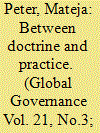

|
|
|
|
|
| Summary/Abstract |
Mandates of recent peacekeeping operations across Africa have shown substantial innovation in the thinking of the UN Security Council. Offensive use of force, use of unmanned aerial vehicles, strategic intelligence and communication, and state-building mandates in the midst of conflicts have all expanded the scope of activities beyond what the UN peacekeepers are accustomed to. The UN is entering a new era of enforcement peacekeeping. Enforcement peacekeeping manifests itself both in enforcement of political solutions through support of a government's state-building ambitions and its attempts to extend state authority in the midst of conflict and in enforcement of military victories through the offensive use of force. These developments further unsettle the basic principles of UN peacekeeping—consent, impartiality, and nonuse of force—resulting in a schism between the doctrine and practice. This contribution argues that such fundamental challenges, when not properly acknowledged, create a wall between operational activities and strategic considerations. They preclude a proper debate on the problematic externalities, in particular on political processes and peacebuilding.
|
|
|
|
|
|
|
|
|
|
|
|
|
|
|
|
| 9 |
ID:
085824
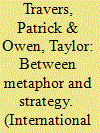

|
|
|
|
|
| Publication |
2008.
|
| Summary/Abstract |
Canada's mission in Afghanistan has evolved considerably. What began as a contribution to operation Enduring Freedom in the aftermath of 9/11 has since transformed into postconflict reconstruction, counterinsurgency warfare, and nationbuilding.
|
|
|
|
|
|
|
|
|
|
|
|
|
|
|
|
| 10 |
ID:
183244
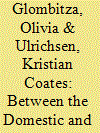

|
|
|
|
|
| Summary/Abstract |
This Special Issue examines post-2011 dynamics and the plethora of changes in the regional and domestic order in the Middle East and the Persian Gulf. It argues that ideational factors are instrumental in both the building of peace and the construction of threats. Consequently, ideational factors are constitutive in inciting or pacifying cases of tension and conflict. Departing from the inherent connection between the domestic and the international, the Special Issue analyses the reconfiguration of the region through the lens of possibilities rather than impediments and centres on the role of ideational factors in foreign policy and their impact on peacebuilding in the region.
|
|
|
|
|
|
|
|
|
|
|
|
|
|
|
|
| 11 |
ID:
190214
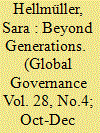

|
|
|
|
|
| Summary/Abstract |
Authors commonly categorize peace missions according to different generations: first-generation missions serving as interposition forces to monitor a cease-fire, second-generation missions with multidimensional mandates, and third-generation missions with enforcement mandates. While the generation typology is useful to show the development of peace missions over time, this article points to four main limitations: ambiguity, reductionism, linear connotations, and restricted applicability. It proposes an alternative categorization distinguishing between a minimalist approach aiming at ending violence, a moderate approach aiming at ending violence and installing some form of good governance, and a maximalist approach aiming at addressing the root causes of conflict. Based on an analysis of all UN peace missions between 1991 and 2020, the article demonstrates how this new classification overcomes the flaws of the generation typology and presents further advantages related to its focus on objectives, its versatility, and its potential for statistical analysis. It thereby allows for a more accurate analysis of UN peace missions and their effectiveness.
|
|
|
|
|
|
|
|
|
|
|
|
|
|
|
|
| 12 |
ID:
091969
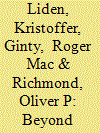

|
|
|
|
|
| Publication |
2009.
|
| Summary/Abstract |
Reflecting the Western-led, international political climate after the Cold War, the various peace operations of the last two decades have sought to build sustainable forms of peace through political, social and economic liberalization. As postulated by liberal constitutionalism and internationalism, these efforts are expected to contribute to international as well as domestic peace by adding the liberalized state to a pacific union of liberal democracies. Their aim is to reproduce the (neo)liberal (meaning a market democracy) sovereign state and a liberal normative and institutional system of government and international governance.
|
|
|
|
|
|
|
|
|
|
|
|
|
|
|
|
| 13 |
ID:
156245
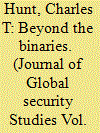

|
|
|
|
|
| Summary/Abstract |
The multiplicity of sources of security and justice in post-colonial states are often categorized according to a series of fixed analytical binaries. Such reductive dichotomies often mask the fluid and evolutionary ecology of these highly networked actors. As a result, the ways in which they co-produce social order are seldom well-understood and the ramifications for peacebuilding remain underexplored. This article examines the relationships between myriad providers of security and justice. Using examples from fieldwork in West Africa, it presents a case for a relational approach to peacebuilding that introduces the concept of symbiosis to develop a framework for evaluating these relations. It argues that the framework and conceptual steps involved create important opportunities for both new research and emerging practices of peacebuilding.
|
|
|
|
|
|
|
|
|
|
|
|
|
|
|
|
| 14 |
ID:
139239
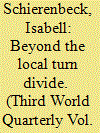

|
|
|
|
|
| Summary/Abstract |
This article builds on the contributions to this special issue by examining different approaches to the local turn and what can be learnt from applying them. The contributors agree on the imperative of understanding ‘the local’ in peacebuilding; however, there seems to be a multitude of ways forward in this regard. The immediate concern is how this acknowledgement translates into practices that allow for both efficiency and local emancipation in the building of peace. The article suggests giving up the ‘one-size-fits-all’ model of peacebuilding and engaging in context-based methods and research designs beyond generalisations. One way to go about this is to strive for interdisciplinary research – combining peace studies and political science with social anthropologists and area studies – but also to involve ‘the locals’ themselves in the process of taking a few methodological steps further.
|
|
|
|
|
|
|
|
|
|
|
|
|
|
|
|
| 15 |
ID:
159963
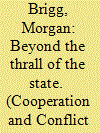

|
|
|
|
|
| Summary/Abstract |
Although the idea of the state pervades the scholarship and practice of international interventions, developing adequate knowledge of intervention contexts such as Solomon Islands requires decentring dominant perceptions about possible sources of socio-political order. In response, this article demonstrates the value of ‘relationality’ and ‘affect’ for analysing the diverse ways in which governance arises as an effect of social practice, without assuming that the state is unimportant or romanticizing statelessness. Giving conceptual priority to relations over entities while considering hitherto neglected affective forms of human interaction enables the identification of diverse micro-political forms of socio-political order and peace governance effects. An autoethnographic examination of relational-affective peace governance in post-conflict Solomon Islands shows that circulations of affect, feeling and emotion attach more strongly to customary and church institutions than they do to the state or to international interveners. This demonstrates the need to engage with unexpected sources of governance while the requirement to analyse findings within a broader historical frame signals the need to also engage with the state. A relational-affective approach, which has the potential for wider application, thus provides a way of analysing and engaging with diverse forms of political order in international interventions beyond the predilections of Northern scholarship.
|
|
|
|
|
|
|
|
|
|
|
|
|
|
|
|
| 16 |
ID:
101151


|
|
|
|
|
| Publication |
2010.
|
| Summary/Abstract |
This article examines the role of bilateral donors and conditional aid in Mozambique's successful post-war peace process. The literature on peacebuilding has tended to privilege the role of UN missions in explaining the outcomes of post-civil war peace processes. The important role that bilateral donors may play in determining these outcomes has not been thoroughly studied. In Mozambique, donors with country experience, knowledge of domestic political actors and constraints, and a shared commitment to a successful outcome, were indispensable to the success of the peace process. The article details this engagement, arguing that it was not UNOMOZ alone, but UNOMOZ as supported by the flexible responses of these donors, that provided an effective third-party guarantee of the peace agreement in Mozambique. It briefly discusses the broader implications of this finding for understanding international peacebuilding efforts.
|
|
|
|
|
|
|
|
|
|
|
|
|
|
|
|
| 17 |
ID:
180644
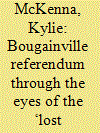

|
|
|
|
|
| Summary/Abstract |
A referendum to decide on Bougainville's future political relationship with Papua New Guinea was held in November 2019. The deferred, non-binding, referendum is a key milestone contained in the Bougainville Peace Agreement (BPA), which sought to reconcile a violent conflict from 1988 to 1998. Although the Bougainville peace process has been deemed a success and significant milestones have been reached towards implementation of the BPA, the conflict continues to have enduring impacts. Particular concerns have been raised about Bougainville's large youth population, often referred to as the ‘lost generation’. This paper documents observations of the 2019 referendum from the perspective of four university students born during the conflict in Siwai District, South Bougainville, whom participated officially in the referendum as an observer group. While trauma and a disrupted education have contributed to youth unemployment and substance abuse in Bougainville, the paper offers a stark contrast to negative narratives of young Bougainvilleans as lacking capabilities to contribute to social and political life. As Bougainville embarks on yet another period of political uncertainty, the paper calls for greater attention to finding avenues to support these young voices to ensure that their generation is not ‘lost’ forever.
|
|
|
|
|
|
|
|
|
|
|
|
|
|
|
|
| 18 |
ID:
069584
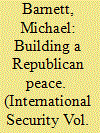

|
|
|
| 19 |
ID:
171985
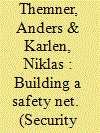

|
|
|
|
|
| Summary/Abstract |
The disarmament, demobilization, and reintegration of ex-combatants has become an integral part of peacebuilding. Although the main purpose of such interventions is to dissolve the military structures of armed groups, there is growing evidence that ex-combatant networks often remain intact. We investigate why such structures continue to thrive. We argue that ex-military networks are stronger when ex-commanders have weak links to elite patronage systems. Ex-combatants who are unable to rely on their former superiors for economic assistance must instead build denser ties to each other to gain access to a social safety net. To assess our argument, we conduct a comparative social network analysis (SNA) of two ex-military networks in Liberia. This innovative approach helps us uncover previously overlooked, but central, dynamics related to ex-combatant groups. We thereby show that SNA provides a range of underutilized tools and exact definitions that can increase our understanding of ex-military networks.
|
|
|
|
|
|
|
|
|
|
|
|
|
|
|
|
| 20 |
ID:
022189
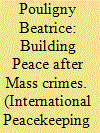

|
|
|
|
|
| Publication |
Summer 2002.
|
| Description |
202-221
|
|
|
|
|
|
|
|
|
|
|
|
|
|
|
|
|
|
|
|
|